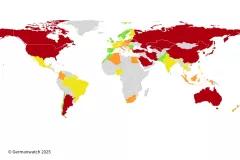Activities by cities, regions, business and sectors to reduce greenhouse gas emissions are numerous and help to fulfil national emission reductions targets.
Cologne, 25 November 2015: Commitments by non-state actors (cities, regions, business and sectors) further reduce German greenhouse gas emissions beyond what is implied by current policies. This is found by new research undertaken by NewClimate Institute supported by Stiftung Mercator.
For the first time, this study quantifies whether and to which extent these activities go beyond what governments have already agreed to do with their national policies. The example of Germany was chosen as a test case. For Germany, the impact of the commitments of non-state actors on emissions - additional to the effect of implemented policies - is small but not insignificant. Germany’s climate and energy policy framework is in many cases more ambitious than the commitments by non-state actors. But some initiatives such as the state-level targets of North Rhine Westphalia and Bavaria, some city level targets, as well as the European Wind Initiative and efforts to increase renovation rate of buildings are more ambitious than current German national policy.
In quantitative terms: Commitments by non-state actors would reduce emissions in 2020 by around 14 to 32 MtCO2e/year in addition to the implemented policies in 2020, which is 0.8 to 1.7 % of 1990’s emissions, narrowing the implementation gap towards the 40% reduction target (currently 85MtCO2e in 2020) by a quarter.
These additional emission reductions from non-state actors can be enough to raise Germany’s ambition level. If Germany were to fulfil its 40% target in 2020 as currently planned, the commitments of non-state actors, in particular from North Rhine Westphalia and Bavaria would add another reduction of 9 to 18 MtCO2e/year in 2020 (0.5 to 1.0% of 1990’s emissions).
The impact of commitments by non-state actors is likely to be higher in other countries, e.g. in countries like the USA with significant corporate level targets or China and India where many economic activities are covered by global initiatives.
The impact is also likely to be higher in the future as more and more non-state actors are proposing targets to reduce greenhouse gas emissions. For example, 36 new initiatives with global scope were formed in 2014/15.
“If the governments would take into account all the new action that is undertaken by cities, regions and companies, they could take on more ambitious national goals”, says Prof. Dr. Niklas Höhne, Founding Partner at NewClimate Institute, one of the authors of the study. “This is particularly important, as the national targets proposed for the new international climate agreement still need to be strengthened significantly to be in line with the agreed goal to limit global temperature increase to 2°C.”
Dr. Lars Grotewold, Director Centre for Climate Change at Stiftung Mercator, adds: “A successful energy transition is key for effective climate change mitigation. The study reminds us of the crucial importance for cooperation between the public and private sectors as well as civil society to bring about ambitious reductions of greenhouse gas emissions.”
Read the full report here






